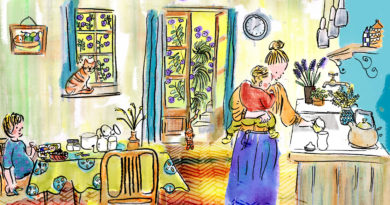The Tradition of La Leche League Meetings in Switzerland
The La Leche League came to Switzerland in 1973, when Christina Hurst-Prager led the first Swiss La Leche League Meeting in Zurich, bringing with her the LLL tradition of providing warm-hearted breastfeeding support and encouragement on a mother-to-mother basis. Many mothers who regularly attended these first meetings realized that their own breastfeeding knowledge and experiences could help other mothers and so became interested in training to become LLL Leaders themselves. Thus, La Leche League Switzerland was born. Although much has changed in breastfeeding practices in the years since its inception, the LLL follows the selfsame goals and traditions today as it did in the very beginning: to provide all mothers, regardless of their backgrounds and their financial situations, with gratis breastfeeding help and support so that they can establish satisfying and fulfilling mother-child relationships while creating optimal conditions for the physical and mental development of their children through breastfeeding.
In the past few decades, much has changed in the nurseries and paediatric wards of hospitals. Even only recently, mothers and newborns were routinely separated for up to 24 hours directly after birth. It is now known that such separations are detrimental to breastfeeding and to the mother-child relationship. Mothers and their children both have a need to be together as soon as possible after birth to get to know one another, to bond, and to get breastfeeding off to a good start. What was unthinkable 40 years ago is commonplace today: mothers can usually hold and breastfeed their children immediately after birth – and La Leche League has done much to help bring this about.
The usual practices for after the neonatal period have also changed considerably. Forty years ago, for example, it was recommended to introduce solids to babies at somewhere between one and three months of age. Medical research and evidence that milk production declines when supplementary foods are introduced too early led the founders of La Leche League to suggest that complementary food should not be introduced until at least the fourth, and preferably the sixth, month. Today, this recommendation is supported by paediatricians and other health care professionals the whole world over.
Virtually all health-care professionals now agree that breastfeeding is best for both mothers and babies. Attitudes toward breastfeeding have changed fundamentally worldwide. Especially here in Western Europe, the question therefore arises: Is the La Leche League still necessary? We of the La Leche League would honestly like to answer in the negative, but, alas, we believe that the answer is still a resounding yes, and so our work continues. Our reasons are many:
- Despite the theoretical recognition of the benefits of breastfeeding, our Western culture is still not breastfeeding-friendly. The unspoken norm in the minds of most people, in the media, and in advertising is still bottle-feeding. Women are still discouraged from breastfeeding in public, especially when breastfeeding toddlers and not infants. And too often, women are advised by friends, family, and health-care professionals to wean completely before they and their children are ready for this step.
- Even breastfeeding-friendly professionals often lack the practical knowledge and experience to support a breastfeeding mother effectively. Breastfeeding means a long-lasting commitment. To carry this through, a mother needs affirmation and fellowship with other mothers.
- Today, young mothers often want or need to work outside of the home. They are frequently ill-informed about their rights and options when it comes to questions about combining breastfeeding and gainful employment. Here also, the La Leche League can offer competent help and support.
La Leche League’s worldwide success is based on providing practical information, warm-hearted compassion, and long-term support. Breastfeeding women come to the La Leche League seeking corroboration, mother-to-mother support, and answers to basic questions: How do I know that my child is getting enough milk? How do I know if it is hungry? When will my child sleep through the night?… Through the generations, the needs of children and mothers remain the same, even when external circumstances have changed dramatically. Through the LLL, the tradition of offering mother-to-mother breastfeeding encouragement and support to all mothers continues.
La Leche League volunteers are ready to answer your questions about breastfeeding by telephone, via e-mail, and in person at LLL meetings throughout Switzerland. For details on how to contact us or to support us in our work, please visit our website at https://lalecheleague.ch/en/.
By Beth Brupbacher
Beth has the distinction to be the last woman to have trained as an LLL Leader under the guidance of the now retired LLLCH founder Christina Hurst-Prager. What Christina first brought to Switzerland more than 40 years ago is now flourishing, with LLL Meetings being offered in English, German, French, Italian and Spanish; and telephone help offered in all these languages plus a few more.
Illustration by Lemady Rochard
Lemady is an artist and illustrator who also runs Storycraft classes and parties for children at the mal_Raum art studio in Ruschlikon, ZH. She has a background in theatre arts and children’s literature. Lemady lives near Einsiedeln SZ with her family. Contact her: Storycraft.ch@outlook.com Facebook: www.facebook.com/lemadyart



